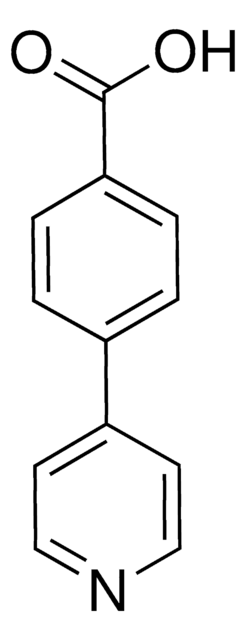I17508
Isonicotinic acid
99%
Synonym(s):
4-Picolinic acid, Pyridine-4-carboxylic acid
About This Item
Recommended Products
Assay
99%
form
powder
technique(s)
cell culture | plant: suitable
mp
≥300 °C (lit.)
SMILES string
OC(=O)c1ccncc1
InChI
1S/C6H5NO2/c8-6(9)5-1-3-7-4-2-5/h1-4H,(H,8,9)
InChI key
TWBYWOBDOCUKOW-UHFFFAOYSA-N
Looking for similar products? Visit Product Comparison Guide
Application
- An organocatalyst in the one pot four component condensation reaction, to synthesize pyranopyrazoles based heterocyclic compounds.
- An organic ligand for the preparation of copper(I) halide coordination polymer [CuBr(IN)]n, by hydrothermal method.
- As a starting material for the synthesis of cation-dimers with potent antimalarial activity.
Signal Word
Warning
Hazard Statements
Precautionary Statements
Hazard Classifications
Acute Tox. 4 Oral
Storage Class Code
11 - Combustible Solids
WGK
WGK 3
Flash Point(F)
Not applicable
Flash Point(C)
Not applicable
Personal Protective Equipment
Certificates of Analysis (COA)
Search for Certificates of Analysis (COA) by entering the products Lot/Batch Number. Lot and Batch Numbers can be found on a product’s label following the words ‘Lot’ or ‘Batch’.
Already Own This Product?
Find documentation for the products that you have recently purchased in the Document Library.
Customers Also Viewed
Our team of scientists has experience in all areas of research including Life Science, Material Science, Chemical Synthesis, Chromatography, Analytical and many others.
Contact Technical Service









